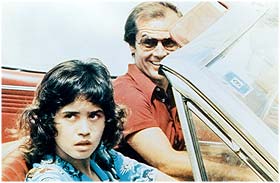
I happened to see two films of the same title yesterday, by pure coincidence. The first one was a Franco-Québécois-Japanese production from which I have three degrees or so of separation. A friend of mine edited a short film directed by one of the associate producers on this one. The short, which will remain unnamed, was awful, but this was a lot better. The tale is of a dodgy Japanese businessman, who is apparently robbed of money he owes a mob syndicate by a dodgy Québécois businessman. His teenage daughter then persuades her part-time mobster, part-time rent boy boyfriend to go to Canada and get it all back, thereby saving her father's skin. The plot is the least interesting part of the whole thing and even the twist in the final five minutes of the film is a bit pointless. But the film succeeds in its immaculate framing, particularly of long shots, and the editing is superb, chugging along at a nice slow pace, yielding its secrets only every so often. Not bad for a film with a shooting budget of 95,000 euros.
The second is Michelangelo Antonioni's much better known 1975 film, starring Jack Nicholson as a disillusioned reporter, who swaps identity with a casual acquaintance who dies on a trip to an unnamed Saharan country (most likely Niger or Chad), thereby faking his own death in the process. It turns out that the other chap was a shady arms dealer and it is up to Jack to seize the day and ride his luck and travel all around Europe in an existential haze, or it seems, just for the heck of it, while his widow gets suspicious and tracks him down to Almeria. I saw it first about six or seven years ago on video and I was surprised, upon watching it again how funny it is, which is not usually the most striking quality of an Antonioni film. There is an unusually dizzying sense of release and abandon in the way that Nicholson runs away from everything (one great scene has the Maria Schneider character asking him what he is running from and he tells her to turn around in the car and look at the road behind) and I imagine that the film's trans-European trajectory would have had an even greater romance in the days before cheap flights. The famous penultimate shot, a five-minute zoom-and-pan that appears to pass through the grills of a window is not, on second viewing quite as virtuostic as I originally thought - if you look closely you can see the joins - but it is an amazing shot in terms of composition and the way it draws the action to a close, reprising the grammatical elements of so many earlier shots in the film. One I would like to see again.
And if that weren't bad enough, there have been three other films named The Passenger released in the past year.





0 comments:
Post a Comment